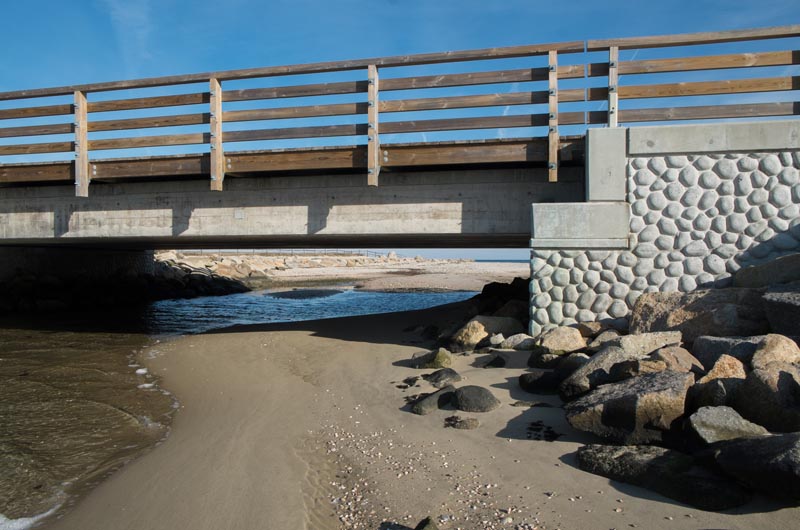Discouraged by a stalled quest for federal funding, the town of Oak Bluffs is now looking for other ways to dredge the sand-filled channel beneath the Little Bridge at Sengekontacket Pond.
The inlet that once exchanged water between the sea and the saltwater pond has now closed and the window to dredge it is also closing, with April the hard deadline for work to be done.
The town did receive word from the Federal Emergency Management Agency this week that they are preparing to grant preliminary approval for the dredging project, but FEMA has yet to commit any funds.

“It’s obviously very encouraging news and they seem to be supportive, but it does stop short,” town administrator Robert Whritenour told the Oak Bluffs selectmen Tuesday. “By this time, we really should have the final approval.”
Sediment has been piling up under the Little Bridge since Hurricane Sandy, when many parts of town were damaged by high winds and waves. As the volume of the sand increases, so does the price tag for its removal.
Rather than wait for FEMA to award the disaster aid the town has applied for, Mr. Whritenour recommended that the town go forward with dredging on its own and look to FEMA for possible future reimbursement. March is the last month that dredging is allowed at the site under state permitting before fall.
“What the town needs to do is take it on as its own project,” he said.
That might mean asking town voters for the money, an amount that could exceed $325,000, at a special town meeting. When the project went to bid last spring, the bids that came back ranged from $325,000 to $390,000. Costs have likely increased in the months since, as more sand piles up at the channel’s mouth, said shellfish constable David Grunden.
The project is particularly pricey due to specifications tied to eligibility for federal reimbursement.
No local contractors meet the requirements, which include the use of sophisticated dredging equipment, Mr. Grunden said.
At the meeting Tuesday, members of the shellfishing community shared concerns that the health of the pond had deteriorated since the inlet’s closing, threatening pond life.
“We have already let it go way longer than it should have, and it could result in that it kills the shellfish on that end of the pond,” said shellfish committee member William Alwardt. Committee member Elizabeth (Betty) Mansure asked if the town could remove a smaller portion of the sand for less expense. “Would you consider just a quick, get some sand out of there?” she asked.
Mr. Grunden said the amount of sand was so great that a $25,000 removal would not make much of a dent. “It will just collapse in because there is so much sand in there,” he said.
The channel was once dredged annually, but Hurricane Sandy and subsequent storms have accelerated the closing of the inlet.
Oak Bluffs has been petitioning for federal funds for five separate Sandy-related projects, including the Little Bridge, but after two years, no funding has been approved.
“It’s amazing how nonplussed they are with our plight,” selectman Gregory Coogan said. Selectmen agreed that to FEMA, projects in Oak Bluffs are low on their priority list.
“You have got to understand that, in the scheme of things, this is nothing,” said selectman Gail Barmakian. “It’s not an emergency, they are faced with million-dollar projects with towns going under the water.”
Mr. Coogan said going forward with the project independent of the FEMA process was the only “sane” way to go.
“I’d love to put my beach chair in that channel again this summer, but I will give up my own personal interests to have it dredged,” he said with pointed irony.
Mr. Coogan said he would meet with the town administrator and the shellfish constable to explore other sources of funding.
“Let’s not leave anything undiscovered,” he said.
In other business Tuesday, the selectmen thanked Jardin Mahoney for donating the Christmas tree for the annual tree-lighting ceremony.
They also voted to allow shellfishing in the Oak Bluffs harbor beginning Dec. 6 for recreational permit holders and two days later for commercial permit holders.
In the harbor, shellfishermen can rake for quahaugs and dig steamers in a more sheltered environment than the coastal ponds, Mr. Grunden said.







Comments
Comment policy »